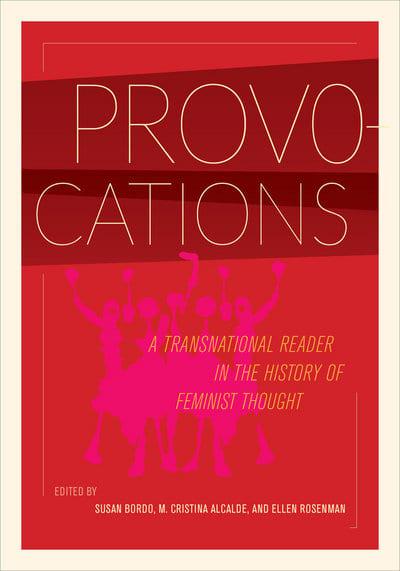Review:Provocations: A Transnational Reader in the History of Feminist Thought
 Provocations: A Transnational Reader in the History of Feminist Thought
Provocations: A Transnational Reader in the History of Feminist Thought
Edited by: Susan Bordo, M. Cristina Alcalde, and Ellen Rosenman
Review by A. Thompson
It is easy to be overwhelmed by the vastness of feminist ideology. The tenets of feminism have evolved and expanded over centuries and around the world, resulting in countless texts and theoretical approaches for how to achieve equality of the sexes. For the reader interested in this evolution, Provocations is an illuminating guide.
In their Foreword, editors Susan Bordo, M. Cristina Alcalde, and Ellen Rosenman reveal the original purpose behind Provocations: “to create a course in the history of feminist thought that would be both transnational in coverage and historically organized” (xvii). To achieve this ambitious goal, the textbook is divided into five chronological sections ranging from feminist thought in Ancient Greece to present-day feminist discourse around the globe. These five sections are then subdivided into subject-specific chapters, each of which begins with a context-providing essay, followed by primary sources that explore the issues being addressed in the chapter. True to its textbook nature, the book includes several “Discussion Questions” that prompt students, teachers, and general-interest readers to reflect on their own attitudes.
In many ways, Provocations succeeds in its aim. Bringing together feminist thought from five continents, the book illustrates the complex field of feminism and the ways it has evolved over the centuries. And by using primary texts alongside its analytical essays, Provocations demonstrates “that the world is not a collection of discrete and disconnected items […] but an infinite set of relations, interactions, exchanges, and conflicts, many of them anchored in inequalities and culture-bound perceptions” (xviii). This dynamic and expansive vision is perhaps the book’s greatest strength.
Yet it is the very breadth of Provocations’s aim that sets it up for its shortcomings. One can easily argue that it is impossible for a single print book to explore feminism in all its depths, and, for Provocations, that is the case. While the book does center a variety of voices, there are voices whose absence—or, in some cases, brief presence—is painfully noticeable, including (but not limited to) transgender women and Indigenous women around the world. That is not to say that Provocations ignores or dismisses them, but rather that these are voices that deserve and necessitate significant space in any feminist textbook.
Nonetheless, Provocations is an informative and engaging read. Despite its limitations, this textbook is an impressive presentation of several centuries’ worth of feminist theory and thought, history and insight that remain important today.
